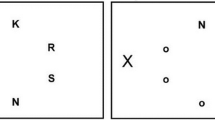Abstract
A recent study demonstrated that a single session of mindfulness meditation increased false memories using the Deese-Roediger-McDermott (DRM) paradigm. This purportedly resulted from mindfulness meditation inducing nonjudgmental observation of experience that contributed to failure to distinguish internally generated from externally presented information. We sought to replicate these results and extend them by warning half of the participants that the DRM task would elicit false memories. We hypothesized that we would see a lower incidence of false memories in the mindfulness induction–warning group consistent with previous findings regarding control of attention. In two experiments, we found results inconsistent with our hypotheses: in Experiment 1, the mindfulness induction did not lead to a greater number of false memories, nor did the warning interact with the induction; in Experiment 2, groups did not differ in the number of false memories, and the mindfulness meditation group significantly decreased false memories after the mindfulness induction. We propose that it may be too early to conclude that mindfulness meditation increases susceptibility to false memory.

Similar content being viewed by others
References
Arch, J. J., & Craske, M. G. (2006). Mechanisms of mindfulness: Emotion regulation following a focused breathing induction. Behaviour Research and Therapy, 44, 1849–1858. doi:10.1016/j.brat.2005.12.007.
Baddeley, A. (2012). Working memory: Theories, models, and controversies. Annual Review of Psychology, 63, 1–29.
Chiesa, A., Calati, R., & Serretti, A. (2011). Does mindfulness training improve cognitive abilities? A systematic review of neuropsychological findings. Clinical Psychology Review, 31(3), 449–464.
Cowan, N. (1999). An embedded-processes model of working memory. Models of working memory: Mechanisms of active maintenance and executive control. Cambridge University Press.
Kabat-Zinn, J. (1990). Full catastrophe living: Using the wisdom of your body and mind to face stress, pain, and illness. New York, NY: Dell.
Kane, M. J., & Engle, R. W. (2002). The role of prefrontal cortex in working-memory capacity, executive attention, and general fluid intelligence: An individual differences perspective. Psychonomic Bulletin & Review, 9, 637–671.
Kane, M. J., & Engle, R. W. (2003). Working memory capacity and the control of attention: The contributions of goal neglect, response competition, and task set to Stroop interference. Journal of Experimental Psychology: General, 132, 47–70.
Morrison, A. B., Goolsarran, M., Rogers, S. L., & Jha, A. P. (2014). Taming a wandering attention: Short-form mindfulness training in student cohorts. Frontiers in Human Neuroscience, 7, 897.
Mrazek, M. D., Franklin, M. S., Phillips, D. T., Baird, B., & Schooler, J. W. (2013). Mindfulness training improves working memory capacity and GRE performance while reducing mind wandering. Psychological Science, 24(5), 776–781.
Mrazek, M. D., Smallwood, J., & Schooler, J. W. (2012). Mindfulness and mind-wandering: Finding convergence through opposing constructs. Emotion, 12(3), 442–448.
Roediger, H. L., & McDermott, K. B. (1995). Creating false memories: Remembering words not presented in lists. Journal of Experimental Psychology: Learning, Memory, and Cognition, 21(4), 803–814.
Roediger, H. L., Watson, J. M., McDermott, K. B., & Gallo, D. A. (2001). Factors that determine false recall: A multiple regression analysis. Psychonomic Bulletin & Review, 8(3), 385–407.
Stadler, M. A., Roediger, H. L., & McDermott, K. B. (1999). Norms for word lists that create false memories. Memory & Cognition, 27(3), 494–500.
Watson, J. M., Bunting, M. F., Poole, B. J., & Conway, A. R. (2005). Individual differences in susceptibility to false memory in the Deese-Roediger-McDermott paradigm. Journal of Experimental Psychology: Learning, Memory, and Cognition, 31(1), 76–85.
Wilson, B. M., Mickes, L., Stolarz-Fantino, S., Evrard, M., & Fantino, E. (2015). Increased false-memory susceptibility after mindfulness meditation. Psychological Science, 26(10), 1567–1573.
Zeidan, F., Johnson, S. K., Diamond, B. J., David, Z., & Goolkasian, P. (2010). Mindfulness meditation improves cognition: Evidence of brief mental training. Consciousness and Cognition, 19(2), 597–605.
Author information
Authors and Affiliations
Contributions
MB: designed the study, executed the study, assisted with the data analyses, wrote the introduction and general discussion parts of the paper. CW: designed the study, analyzed the data, wrote the method and results parts of the paper.
Corresponding author
Ethics declarations
All procedures performed in these experiments with human participants were in accordance with the ethical standards of the American Psychological Association and approved by the institutional review board. Informed consent was obtained from all individual participants in the study.
Conflict of Interest
Michael Baranski declares that he has no conflict of interest. Christopher Was declares he has no conflict of interest.
Appendix
Appendix
Rights and permissions
About this article
Cite this article
Baranski, M., Was, C.A. Mindfulness Meditation May Not Increase False-Memory and May Instead Protect from False-Memory Susceptibility. Mindfulness 8, 1569–1579 (2017). https://doi.org/10.1007/s12671-017-0729-7
Published:
Issue Date:
DOI: https://doi.org/10.1007/s12671-017-0729-7




